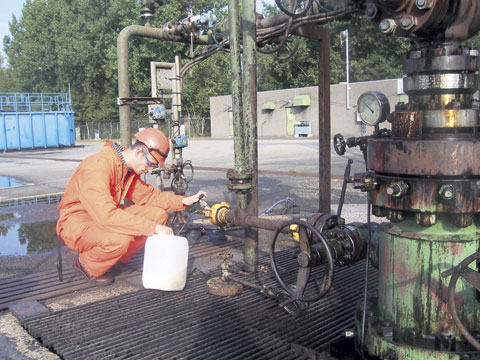Bacteria in oil wells can be used to raise oil yields and they are also good indicators of the status of the petroleum field, says Dr Geert van der Kraan, who defended his dissertation on petroleum ecosystems last week.
Bacteria can be annoying little creatures for the oil industry. Initially, pressure in the ground causes oil to burst out of a well, making the first 10 percent of the total content an easy catch. For the secondary recovery stage however seawater is usually injected into the well. And this is where bacteria come into play. Bacteria that use sulphate from the seawater as an energy source prosper, reducing the sulphate levels and producing hydrogen sulphide, which damages the pipelines.
It is not surprising therefore that, when it comes to microorganisms, the petroleum industry has long been focussed on killing bacteria by injecting biocides. But this attitude is changing. “Petroleum microbiology is an emerging discipline,” says Dr Geert van der Kraan, who this week defended his PhD thesis, entitled ‘Subsurface ecosystems – Oil triggered life: Opportunities for the petroleum industry’.
One example of petroleum microbiology is the injection of nitrate into the well. This results in a substrate competition between sulphate reducing bacteria and nitrate reducing bacteria, which is won by the latter bacteria, thus preventing the hydrogen sulphide production. Van der Kraan thinks that, in addition to tackling the hydrogen sulphide problem, this technique can also help increase oil yields: “By injecting nutrients you can feed certain bacteria that form bio films in the porous rock. This can be interesting if a well consists of several rock layers that are not all as permeable. All the water you inject in the well will flow through the most permeable layer, so none of the oil from the other layers will be flushed out. Moreover, if you can get bacteria to block the most permeable layer after it is depleted, then the other oil can be won as well.”
To test this hypothesis, the Delft researcher had an idealized pore structure of glass made in which he could grow bacteria. Using particle image velocimetry, an optical method of fluid visualization, he then looked at how water flowed through the pores. “The experiments showed that the bacteria can obstruct the rock,” Van der Kraan explains. “But it’s still very speculative whether this technique can be used in the field, since the structure of the rock is very complex.”
Van der Kraan also wanted to discover whether the microbial changes (i.e. the types and quantity of bacteria present) could be used as an information source to track what is taking place in the oil field. For this he studied various Dutch oil fields, focusing on the microbial communities living there. He believes that changes in the microbial diversity of the pore water from the oil well can provide a good understanding of the changing geochemical conditions in the oil field itself.
To help keep the mess made by sixteen guys somewhat under control, the student house on Oudraadtweg 27 employs someone who can best be described as a mother hen. “Ada, or as we call her, Aad, has been coming here every Monday and Thursday to clean for the past thirthy years,” says Maarten Vissers. “And she knows more about our house than many of us residents. Because student houses aren’t known for their cleanliness, Ada tries to ensure that we don’t kill ourselves by food poisoning or bacterial infections.”
Ada is always happy to hear the latest gossips and also always has much to tell each morning when she and all the housemates happily sit down to have tea and cookies together. Thus Ada not only helps bring the housemates closer together but also helps stop the young students from staying in bed all day and falling behind in their studies. Next to the teapot is a bottle of alcohol that serves as the sugar bowl.
For the first-year students, Ada is like a bridge, helping them transition from living with their parents; they must open doors for Ada and give her three kisses when they meet, serve the tea and, if she asks, also give her a quick shoulder massage. A special Aad-commissioner is responsible for providing all that Ada needs, like cleaning supplies and cookies, as well as a present on her birthday. And it’s a position that must be earned. “To be appointed Aad-commissioner you first have to use a toilet brush to clean the toilet that the ex-commissioner just soiled.”
Ada is of course also growing older. “We’ll certainly miss her when she’s gone, but happily she has nice daughters who we’re secretly counting on. In any case, this tradition will always continue.”



Comments are closed.